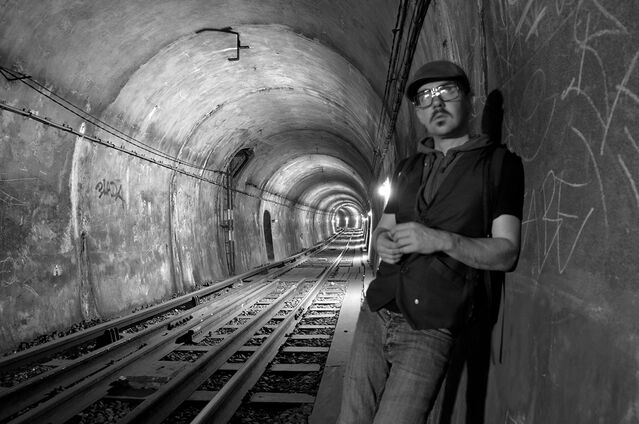Off The Map
Social and cultural geographer Bradley Garrett explores what hidden places reveal about us.
By Matt Huston published June 19, 2020 - last reviewed on July 10, 2020

During a series of trespasses through tunnels, up towers, and into other places he wasn’t technically allowed to be, Bradley Garrett found himself in a gargantuan Cold War-era bunker. At the time, Garrett, who lectures in the School of Geography at University College Dublin, was chronicling—and living—the lifestyle of “urban explorers,” who team up to infiltrate restricted or abandoned city spaces. That visit planted the seed for his new book, Bunker: Building for the End Times, and sent him underground with a different crowd: “preppers,” who buy personal bunkers, stock up, and start like-minded communities in anticipation of every imaginable catastrophe.
What motivated you to become an urban explorer?
I lived in London for a decade, and I would get to this kind of boiling point where I just could not handle the cramped space and the people around me anymore. Opening up a manhole and going into the sewer was a relief. You could walk around all night long and never see anyone. It was like a wilderness under the city. You would find incredible architectural spaces that were 150 years old, built out of handmade brick, that no one else ever sees. There was a fantastic sense of discovery.
What stops others from going underground?
Risk aversion is baked into our culture. If you go skydiving or bungee-jumping, things that are perfectly safe in statistical terms, the response from people is often, “Why would you take that risk?” But if you are confronted with a blackout or a tornado or a wildfire and you’ve put yourself in risky situations before, you’re better equipped because you’re not prone to panic in the same way.
Did urban exploration give you insight into surveillance and privacy?
We saw the escalation of camera systems and security systems. They started putting laser sensors in stairwells. Then facial recognition started to come in. Now we’re surveilling ourselves with the phone in our pocket. I and others eventually got arrested in London for an exploration. And one of the first things that happened was that the prosecution produced all of our phone records, including our text messages and location tracking.
What do the preppers you’ve met seem to gain from prepping?
It’s a kind of existential insurance policy. You invest time and effort into getting organized and working through scenarios, and it seems to make people feel better. It’s kind of like spring cleaning: You go through your house, get rid of all the things you don’t need, and have that kind of peaceful moment when you know where everything is. Prepping is like that except instead of dealing with the present, they’re dealing with the future—a range of speculations about things that might go wrong. Regardless of their political, social, or religious background, they all told me that it gave them a sense of solace.
Did you derive any wisdom from your time with them?
I gained a renewed faith in localism and family. The life that I was living, flying all over the world, going from planes to rental cars, felt so disconnected from people and the world in some way. I think that has to change. “Bloom where you’re planted,” one prepper told me. Just work with what you’ve got.
Did the experience make you consider becoming a prepper?
If I’ve learned anything during the pandemic, it’s that I would not do well in a bunker for a long period of time. Any preparations I would undertake would be more along the lines of “skilling up.” Building shelters is fun, trying to figure out how to use pine needles and moss and other materials to build something that you can sleep in for a night. Even working on vehicles fascinates me now in a way that it never had before. Practical preparation, a kind of base-level resiliency, is something that we should all be doing. Eventually I’d love to just go off-grid and grow my own food.
What can we learn by studying bunkers?
The physical space and the way people interact with it is a kind of mirror of our society. Once I started going into bunkers, I began seeing that architecture of dread everywhere, that feeling that there is a disaster just over the horizon that people can’t quite articulate. I started seeing the escalation of vehicle size and people buying ex-military hardware. You can even see it in the locks on doors and gates on windows.
Along with the “architecture of dread,” is there an architecture of hope?
What comes to mind is a glass house. I have memories of visiting extended family in the Midwest, and I locked their door, but no one had a key on them. They had to sit me down and say, “Look, I know you guys in California are paranoid about your neighbors, but we know all of ours.” There’s a kind of hope in that trust. That, perhaps ironically, is part of what preppers are trying to build: a new tribe they can trust and depend on.
